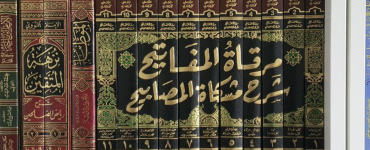Knowing how to study is just as important as studying if not more important. A student spends years studying, however if his methodology is inaccurate and imprecise, then he will fail in gaining maximum benefit.
The acquisition of knowledge requires three dimensions:
1) Abstinence from sin.
2) Constant, persistent and unceasing effort.
3) Retaining and preserving what was studied.
1) Abstinence from sin
As opposed to all sciences, the Islamic sciences are fused with spirituality and Allah consciousness. The stronger the bond with Allah, the greater the understanding of the Islamic sciences. The level of one’s Iman, actions and connection with Allah contribute to one’s knowledge. Knowledge of the Islamic sciences brings with it a huge responsibility. One who is well grounded in the dictates of Shari’ah has the task to promote truth and vanquish falsehood. To identify the truth as the truth and falsehood as falsehood, one needs to gaze at life with eyes immersed in Allah’s recognition. If one is not acquainted with Allah, he will be bereft of the divine light to guide him through the dark challenges of life.
Such qualities can only come with abstinence from sin. The underlying reason is that the Islamic sciences are not there simply to be ‘known’; the Islamic sciences are there to establish a civilisation based on truth, morals, ethics and principles. The purpose of learning is implementation.
2) Constant effort
Now coming onto how to acquire the Islamic sciences, the game plan is one: one has to punch above one’s weight. Greatness cannot be achieved by comfort. Greatness has locked horns with comfort and luxury. They are at loggerheads with one another. The two cannot go hand in hand. A student cannot reach the heights of the great scholars whilst sleeping eight hours a day, eating three course meals and playing Playstation. That’s a fact. Greatness demands great sacrifice. Greatness is not elusive; all of us can achieve it.
Knowledge demands a die-hard attitude. If a student understands this, he is one step away from success.
A student should do the following:
a) PREVIEW
Spend at least 15-30 minutes a day previewing the upcoming lesson. He needs to become familiar with what he will study in the next lesson. At the same time, he should try and understand whatever he can whilst browsing through. Whatever is easy, he will understand right away. Whatever is challenging, he should mark that text. This will make him more focussed when listening to the commentary of that text from his teacher.
b) LISTEN
How many students are there in class but not there? Physically they are in a lesson but mentally they are touring the world! It is of utmost importance to stay mentally present. A student needs to listen to the lecture of his teacher very attentively. He needs to listen and capture the words of his teacher on paper. Whatever he marked out whilst previewing his lesson, he needs to be all ears at such places.
c) QUESTION
A weakness in many students today is the inability to engage with the teacher. Whatever the student has not understood should be ask to his teacher in a very respectable manner. A teacher is there to quell misunderstandings. One must ask his teacher if he has failed to understand. There is no room to be shy or embarrassed. As the famous saying of one of our pious predecessors states,
“A shy person and a proud person can never gain knowledge.”
If a person does not ask, that question will always remain. He will never be confident on the issue.
An important point we need to understand here is to be observant. At times the teacher is in a hurry or wants to finish a particular paragraph. Ask and engage the teacher when the teacher shows his readiness to accept questions. Many a time, a teacher mentions something and a student starts interrupting whilst the lesson is taking place. Even worse, at times the question posed by the student is answered in the book itself in the next sentence. Some teachers are ready to accept questions after a paragraph whilst others prefer at the end of the lesson. Every student should be mindful of his teacher’s preferences.
d) REVIEW
Once the day comes to an end for the world, the day just begins for a student! He has the whole night at his disposal. A student must sit daily to review today’s lesson and master its contents.
The student needs to preview and review at fixed times. He should accustom himself to a timetable. Everything should have an allocated time. The more a student nails himself to a schedule, the more he will progress.
3) Retention
Retention is probably one of the most important dimensions in acquisition. The science of logic (mantiq) defines knowledge as,
“That which is present in the mind.”
Whatever is not in the mind, is not known, hence it is not knowledge. Therefore, a student must memorise as much as he can. How many times are we discussing something we read the night before but cannot recall what we read?
The problem is we do not know how to retain information! Please read the following link to learn retention skills:
A student must allocate time daily for memorising key points and vital pieces of information. Early morning before or after fajr is the optimal time.
If a student can do the above, it is hoped he will be a very competent and proficient scholar. In the past, students lacked the facilities and the means. However, they had the muscle and resilience. Today we have the facilities and the means, we lack aspiration and belief. We must believe we can and we will.
And Allah Ta’āla Knows Best
Maulana Faraz ibn Adam,
www.darulfiqh.com






